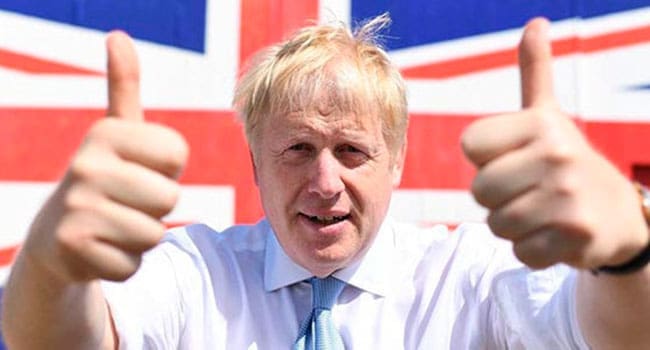 In December 2019, I wrote a column arguing that United Kingdom Prime Minister Boris Johnson was shaping up as a genuinely consequential politician. And the recent announcement of a new trade deal between the U.K. and the European Union bears that out.
In December 2019, I wrote a column arguing that United Kingdom Prime Minister Boris Johnson was shaping up as a genuinely consequential politician. And the recent announcement of a new trade deal between the U.K. and the European Union bears that out.
First, though, a clarification of terms.
Declaring someone as consequential isn’t necessarily an endorsement of policy. If you think of Brexit as a catastrophic mistake, you’ll have nothing good to say about Johnson.
Being consequential is about impact. Prime ministers often come and go without leaving a ripple behind them. That won’t be said for Johnson.
Brexit is a fundamental change in the U.K.’s relationship with the EU and a turn away from the erosion of national sovereignty. It’s a resounding rejection of the gradual trend towards pooling the U.K.’s sovereignty with Europe.
Let’s also be clear on another point.
| RELATED CONTENT |
| The miraculous recovery of Boris Johnson By Michael Taube |
| Is it curtains for Boris Johnson? By Pat Murphy |
| Boris Johnson is a consequential politician By Pat Murphy |
Calling Johnson consequential doesn’t say anything about the various other criticisms levelled at him. He may – or may not – be an unprincipled opportunist, a fabulist, a clown or a dilettante unwilling to focus on the necessary details of day-to-day governance.
That, however, isn’t relevant. Notwithstanding his late conversion to the cause, Johnson played an indispensable role in getting Brexit done. And that makes him consequential.
He was probably Brexit’s most popular proponent during the 2016 referendum campaign. And given the closeness of the outcome – a 52/48 margin – it’s unlikely that it would’ve carried the day without him.
Then as recently as the summer of 2019, Brexit seemed prospectively doomed. Racked by internal dissension, the U.K.’s Conservative government had failed to deliver.
The fundamental problem was rooted in Brexit’s origins.
It was a bottom-up movement, broadly disdained by the establishment – political, business, media and academic. And although shell-shocked lip service was paid to the referendum result, the establishment thrust was to find a way of diluting or rescinding it.
So when Johnson became Conservative leader and prime minister in July 2019, he faced two challenges.
One was to convince the EU to reopen the unacceptable withdrawal deal it had negotiated with his predecessor. And the other was to change the complexion of parliament, transforming it from anti-Brexit to pro-Brexit.
Both challenges were viewed as tall orders, perhaps impossible. But Johnson delivered.
The withdrawal deal was reopened and some material changes were made. And parliament’s complexion was transformed, first by purging the hard-line anti-Brexiteers from Conservative ranks and then by winning a sweeping general election victory.
That still left unfinished business. Specifically, would the U.K. get a trade deal with the EU or would it be faced with tariffs when the transition period expired?
The expressed assumption of most observers was that the EU held virtually all the cards in this negotiation. So the U.K. would have to accept whatever terms were offered; and if it didn’t fold, calamity beckoned.
For instance, a prominent Canadian business columnist wrote that the U.K. would need to “kowtow.” And a member of Britain’s House of Lords was even more pungent: “We will huff and puff but, in the end, we will basically come to heel.”
Not so.
Like all trade deals, the agreement involves elements of compromise. But the concessions come from both sides. For the most part, Johnson’s negotiators were able to protect their red lines.
Where goods and agriculture are concerned, neither tariffs nor quotas will apply to U.K./EU trade. And because the customs union with the EU is gone, the U.K. is free to independently negotiate trade deals with other countries.
There’s also the matter of law.
Apart from the special case of Northern Ireland, the European Court of Justice’s remit has been effectively removed from U.K. life. U.K. laws will now be only made in the U.K. and interpreted by U.K. judges sitting in U.K. courts.
There are, of course, downsides to the new dispensation.
Although there’ll be no tariffs or quotas, U.K./EU trade won’t be frictionless. And Britons who wish to reside in the EU for extended periods will require a visa.
Reclaiming sovereignty exacts a price. Whether that’s worthwhile depends on perspective.
U.K. Conservatives are notably ruthless and unsentimental when it comes to discarding leaders who’ve outlived their usefulness. While that fate undoubtedly awaits Johnson at some point, he’s still been a man of consequence.
Troy Media columnist Pat Murphy casts a history buff’s eye at the goings-on in our world. Never cynical – well perhaps a little bit.
For interview requests, click here. You must be a Troy Media Marketplace media subscriber to access our Sourcebook.
The views, opinions and positions expressed by columnists and contributors are the author’s alone. They do not inherently or expressly reflect the views, opinions and/or positions of our publication.

